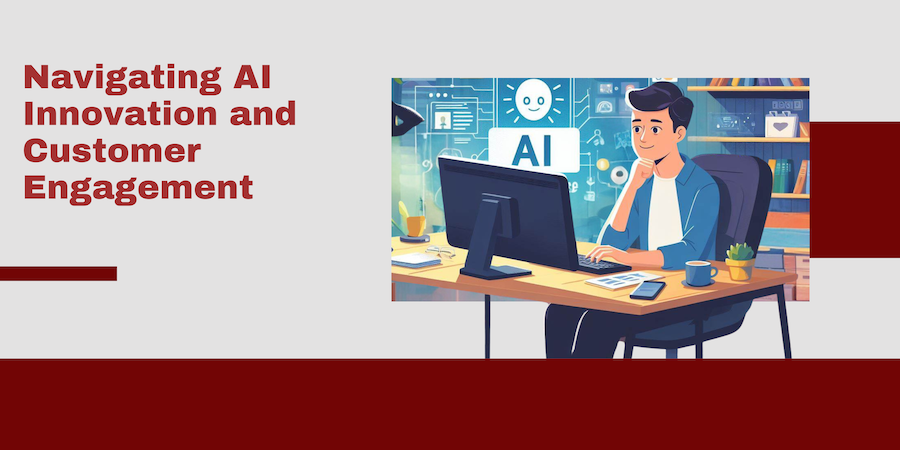As businesses face increasing pressures from both market dynamics and technological advancements, understanding how AI can be harnessed to drive growth and customer satisfaction is crucial.
That’s why today we explore the case of Mistral AI’s rapid valuation growth and market positioning, coupled with a comprehensive guide on leveraging AI to enhance customer engagement, providing a dual perspective that is especially relevant for business owners, C-level executives, and decision-makers.
Mistral AI’s Strategic Fundraising and Innovation Drive: Insights for Business Leaders
1. Overview of Mistral AI’s Recent Developments and Valuation Surge:
Mistral AI, a Paris-based startup specializing in large language models, has made significant strides in its market positioning and technological advancements. Recently, Mistral AI entered discussions to raise new funding at a valuation of $5 billion. This marks a substantial increase from its previous $2 billion valuation in December, reflecting robust investor confidence spurred by recent achievements and partnerships, including significant investments from Microsoft Corp. and Databricks Inc.
The company has also launched Mixtral 8x22B, an open-source LLM utilizing a mixture-of-experts architecture, which enhances computational efficiency by activating only the necessary neural networks for specific tasks. This model has demonstrated superior performance in benchmark tests compared to competitors like Meta Platforms Inc.’s Llama 2 70B, showcasing Mistral AI’s leading-edge capabilities in AI technology.
2. Implications for the Broader Business Landscape:
Mistral AI’s rapid valuation increase and successful funding rounds illustrate a growing investor interest in specialized AI technologies, particularly those that offer innovative solutions like the mixture-of-experts architecture. This trend highlights the increasing importance of AI in driving business efficiency and competitiveness.
For other businesses, especially those in technology and eCommerce, Mistral AI’s advancements signal a shift towards more specialized and efficient AI models that can provide better customer experiences and operational efficiencies. Companies might consider adopting or partnering with AI-driven platforms to remain competitive and meet the evolving expectations of digital consumers.
3. Key Considerations for Business Leaders:
As a business leader, understanding the trajectory of AI development and its implications on your industry is crucial. Here are a few considerations:
- Innovation Adoption: Evaluate how adopting similar AI technologies could enhance your product offerings or operational efficiency. Consider the potential ROI of integrating advanced AI capabilities.
- Strategic Partnerships: Look for partnership opportunities with AI technology providers like Mistral AI to leverage their advancements and tailor solutions to your business needs.
- Competitive Strategy: With AI rapidly becoming a cornerstone of business strategy, staying ahead means not just adopting new technologies, but also actively participating in their development through investments or collaborations.
- Risk Management: As AI technologies drive higher valuations and attract significant investments, assess the inherent risks associated with integrating these technologies, including data security and model reliability.
Conclusion:
Mistral AI’s strategic movements in the AI space are reshaping how businesses perceive and integrate large language models. For business leaders, staying informed and proactive in leveraging AI will be key to maintaining competitive advantage and fostering innovation-driven growth. As Mistral AI continues to evolve and potentially secure a higher valuation, its journey offers valuable lessons on the impact of technological innovation on business scalability and investor attractiveness.
Sources:
https://www.theinformation.com…
Enhancing Customer Engagement with AI:
In the dynamic realm of eCommerce, customer engagement deficiencies such as low interaction or negative feedback from users interacting with AI-driven interfaces pose significant challenges. These deficiencies can lead to decreased sales conversions and lower customer satisfaction, ultimately impacting the overall success of customer operations. As businesses strive to thrive in a competitive market, addressing these engagement issues is crucial.
How AI Can Transform Customer Engagement:
- Personalization through AI: AI-driven personalization is more than just a technological advancement; it’s a strategic tool for enhancing customer relationships. By analyzing vast amounts of data, including purchase history, browsing behavior, and preferences, AI tailors the shopping experience to individual needs. This targeted approach not only meets but often exceeds customer expectations, leading to increased loyalty and higher conversion rates. For instance, businesses that implement AI personalization report up to a 20% increase in customer satisfaction and a significant boost in revenue.
Lastes report “The State of Personalization” by Twilio shows that:

2. Enhanced Customer Journey Mapping: Utilizing AI to map customer journeys allows businesses to gain a comprehensive view of the customer experience. This method identifies key touchpoints and optimizes them to enhance engagement and satisfaction. AI’s predictive capabilities enable businesses to foresee potential pitfalls and opportunities, adjusting strategies proactively to better serve customers and drive loyalty.
3. Real-Time Customer Interaction: Immediate and effective customer support is paramount in today’s fast-paced market. AI excels by providing real-time interactions through intelligent chatbots and virtual assistants, capable of handling a wide range of queries with quick and accurate responses. This not only improves customer experience by reducing wait times but also allows businesses to scale their customer service operations efficiently (Ninetailed).
4. Future Trends and Innovations: The integration of AI in customer engagement is continually evolving. Emerging trends include advanced natural language processing and machine learning algorithms that predict customer needs even more accurately, providing a seamless and increasingly personalized shopping experience. Staying ahead of these trends is vital for businesses aiming to maintain a competitive edge.
Key Takeaways:
Integrating AI into your customer engagement strategy offers a multifaceted solution to enhance interaction and satisfaction. Implementing AI-driven solutions not only addresses current deficiencies but also positions your business for future growth and innovation. Embrace AI technology to transform your customer engagement strategy, ensuring your operations are as efficient, responsive, and personalized as possible.
Conclusion:
The strategic integration of AI in enhancing customer engagement is not just about adopting new technologies but about transforming how businesses interact with their customers to drive growth and satisfaction. By focusing on personalization, enhanced journey mapping, and real-time interactions, businesses can significantly improve their customer engagement metrics, ultimately leading to greater customer retention and increased revenue.
The message is clear: Leveraging AI is not merely an operational decision but a strategic imperative that can define the future success of your enterprise in the digital age.
Sources:

